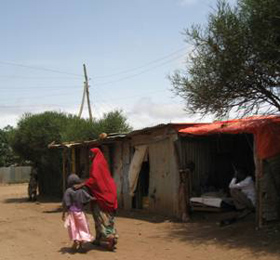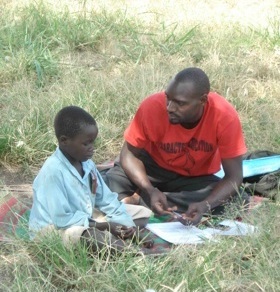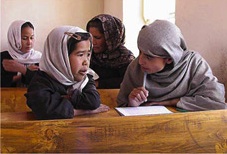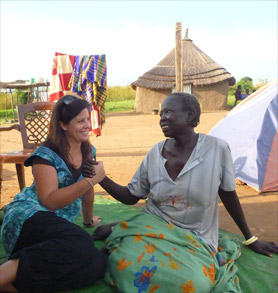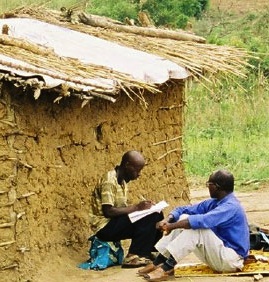Very recently, vivo has started its work with women who have undergone female genital mutilation (FGM) in Ethiopia. In July, August and September 2010 more than 150 interviews with women in Jijiga (close to the Somali border) were conducted on FGM and its mental health consequences, including an intake on the special needs of the women. vivo was impressed by the strength of the women in the Somali region but also very much touched by their horrendous experiences and the pain they have undergone. Knowing about the mental, physical, social and psychological plight of sexually cut women in detail now, we are eagerly planning a focussed treatment and support project.
Projects
All reports about projects of vivo international are displayed.
Giving a voice to victims of female genital mutilation
Very recently, vivo has started its work with women who have undergone female genital mutilation (FGM) in Ethiopia. In July, August and September 2010 more than 150 interviews with women in Jijiga (close to the Somali border) were conducted on FGM and its mental health consequences, including an intake on the special needs of the women. vivo was impressed by the strength of the women in the Somali region but also very much touched by their horrendous experiences and the pain they have undergone. Knowing about the mental, physical, social and psychological plight of sexually cut women in detail now, we are eagerly planning a focussed treatment and support project.
Housing project for HIV/AIDS orphans in Ethiopia
Ethiopia is one of the poorest countries of the world. Already in 2004 it was home to 3.9 Million orphans. While many organizations are providing food, clothes and schooling for these children, vivo’s focus is on the psychosocial needs of these children to ensure their healthy mental development. Back in spring 2006 vivo interviewed more than 100 children orphaned due to HIV/AIDS living in Awassa, in Southern Ethiopia. Beside symptoms of grief, many children living in so-called foster families were suffering from ongoing maltreatment and were exploited by their foster families as servants. Therefore additionally to the implementation of trauma and grief counselling structures for orphans, vivo also engaged in awareness raising activities against child abuse and maltreatment in the community and provided training for local counsellors, grandparents and foster families on ‘positive parenting’.
Lesen Sie weiter: Housing project for HIV/AIDS orphans in Ethiopia
Ethiopia is one of the poorest countries of the world. Already in 2004 it was home to 3.9 Million orphans. While many organizations are providing food, clothes and schooling for these children, vivo’s focus is on the psychosocial needs of these children to ensure their healthy mental development. Back in spring 2006 vivo interviewed more than 100 children orphaned due to HIV/AIDS living in Awassa, in Southern Ethiopia. Beside symptoms of grief, many children living in so-called foster families were suffering from ongoing maltreatment and were exploited by their foster families as servants. Therefore additionally to the implementation of trauma and grief counselling structures for orphans, vivo also engaged in awareness raising activities against child abuse and maltreatment in the community and provided training for local counsellors, grandparents and foster families on ‘positive parenting’.
Continue reading: Housing project for HIV/AIDS orphans in Ethiopia
Violence in the family: Support for affected families in Northern Uganda
Beyond the grievous consequences of war for the individual, exposure to violence on a societal level profoundly disrupts the family system. Loss of family members, psychological suffering of individual family members, high rates of alcohol abuse and the detachment from traditional social support systems such as the extended family adversely affect family relationships. As a consequence families that
have been living through war are at a high risk for family violence even after the war has ended. Children growing up with violence in the family continue to suffer and are vulnerable to develop long-lasting emotional and behavioural problems.
Lesen Sie weiter: Violence in the family: Support for affected families in Northern Uganda
Beyond the grievous consequences of war for the individual, exposure to violence on a societal level profoundly disrupts the family system. Loss of family members, psychological suffering of individual family members, high rates of alcohol abuse and the detachment from traditional social support systems such as the extended family adversely affect family relationships. As a consequence families that
have been living through war are at a high risk for family violence even after the war has ended. Children growing up with violence in the family continue to suffer and are vulnerable to develop long-lasting emotional and behavioural problems.
Continue reading: Violence in the family: Support for affected families in Northern Uganda
Sri Lanka – a country shattered by war and natural disaster
In Sri Lanka’s North-Eastern provinces, traumatic experiences were already common prior to the Tsunami in December 2004. For two decades, thousands of people have been killed and many more were displaced as a result of conflict and violence in the country. The Liberation Tigers of Tamil Elam (LTTE) have been fighting for political autonomy, which resulted in ongoing conflict in the Northern and Eastern areas of the country. Civilians have become casualties of war; landmines and unexploded ordnance posed a constant threat; hospitals and schools have been destroyed; and the economy has been shattered.
Lesen Sie weiter: Sri Lanka – a country shattered by war and natural disaster
In Sri Lanka’s North-Eastern provinces, traumatic experiences were already common prior to the Tsunami in December 2004. For two decades, thousands of people have been killed and many more were displaced as a result of conflict and violence in the country. The Liberation Tigers of Tamil Elam (LTTE) have been fighting for political autonomy, which resulted in ongoing conflict in the Northern and Eastern areas of the country. Civilians have become casualties of war; landmines and unexploded ordnance posed a constant threat; hospitals and schools have been destroyed; and the economy has been shattered.
Continue reading: Sri Lanka – a country shattered by war and natural disaster
vivo starts up in Congo
Violence against civilians is rampant in the Democratic Republic of the Congo’s War. Women and girls are raped on a daily basis and their life is determined by the fear of being victimized. The women and girls, who have survived rape are often left stigmatized and physically and psychological injured for life.
Violence against civilians is rampant in the Democratic Republic of the Congo’s War. Women and girls are raped on a daily basis and their life is determined by the fear of being victimized. The women and girls, who have survived rape are often left stigmatized and physically and psychological injured for life.
Psychosocial support system for 600 youths in Northern Uganda
In close collaboration with the Norwegian Refugee Council’s Youth Education Pack (YEP), vivo started up the development of a long-term psychosocial support system which has so far reached 600 war-affected youths in vocational training centres all over Uganda’s war-torn North. YEP supports most severely affected learners, many of them formerly abducted child soldiers, within ten vocational trainings centres. Within the YEP program learners are enabled to learn practical vocational skills and catch up on academic education in order to reintegrate better within their communities after their return home.
Lesen Sie weiter: Psychosocial support system for 600 youths in Northern Uganda
In close collaboration with the Norwegian Refugee Council’s Youth Education Pack (YEP), vivo started up the development of a long-term psychosocial support system which has so far reached 600 war-affected youths in vocational training centres all over Uganda’s war-torn North. YEP supports most severely affected learners, many of them formerly abducted child soldiers, within ten vocational trainings centres. Within the YEP program learners are enabled to learn practical vocational skills and catch up on academic education in order to reintegrate better within their communities after their return home.
Continue reading: Psychosocial support system for 600 youths in Northern Uganda
Rwandan psychologists trained by their own peers
vivo has been engaged with Rwandan survivors of genocide, still suffering from trauma-related consequences, since 2006. An important component was the training of a group of Rwandan psychologists by vivo experts in Narrative Exposure Therapy (NET) and Interpersonal Therapy (IPT), during the autumn of 2007. Eighty-six genocide victims were randomly assigned into a treatment and a waiting list control group. Under expert supervision, the Rwandan therapists conducted 6 sessions of NET and 2 sessions of IPT and social interventions, each taking between 90 and 150 minutes. All 37 treatments were completed with great success and the participants improved considerably, observed in the reduction of symptoms of trauma, grief, and depression (effect size for the reduction of trauma symptoms: d= 0.66 at 3 month post-test and d= 1.48 at 1 year follow-up).
Lesen Sie weiter: Rwandan psychologists trained by their own peers
vivo has been engaged with Rwandan survivors of genocide, still suffering from trauma-related consequences, since 2006. An important component was the training of a group of Rwandan psychologists by vivo experts in Narrative Exposure Therapy (NET) and Interpersonal Therapy (IPT), during the autumn of 2007. Eighty-six genocide victims were randomly assigned into a treatment and a waiting list control group. Under expert supervision, the Rwandan therapists conducted 6 sessions of NET and 2 sessions of IPT and social interventions, each taking between 90 and 150 minutes. All 37 treatments were completed with great success and the participants improved considerably, observed in the reduction of symptoms of trauma, grief, and depression (effect size for the reduction of trauma symptoms: d= 0.66 at 3 month post-test and d= 1.48 at 1 year follow-up).
Continue reading: Rwandan psychologists trained by their own peers
vivo international’s mental health component within the Colombian Demobilization Program
Violence, attacks, internal displacement, disappearances and abductions of people thousands of murders and illegal recruitment characterize the history of Colombia for more than 50 years. After an ongoing wave of violence and terror, the Colombian government began the disarmament, demobilization and reintegration (DDR) of illegal armed groups in 2006. The process serves 55,800 demobilized and is coordinated by the High Commissioner for Reintegration (Agencia Colombiana para la Reintegración – ACR ) and implemented locally through 26 service centres . The ACR offers the ex-combatants both psychosocial support and assistance in their professional reintegration.
Violence, attacks, internal displacement, disappearances and abductions of people thousands of murders and illegal recruitment characterize the history of Colombia for more than 50 years. After an ongoing wave of violence and terror, the Colombian government began the disarmament, demobilization and reintegration (DDR) of illegal armed groups in 2006. The process serves 55,800 demobilized and is coordinated by the High Commissioner for Reintegration (Agencia Colombiana para la Reintegración – ACR ) and implemented locally through 26 service centres . The ACR offers the ex-combatants both psychosocial support and assistance in their professional reintegration.
Mental health survey among children in Kabul
In February 2005 vivo had trained a group of 32 local counsellors in the concepts of Traumatic Stress, PTSD and Narrative Exposure Therapy for traumatized survivors of the war and Taliban regime in Afghanistan. In October, a vivo team came back to Kabul and, together with the previously trained counsellors, carried out an epidemiological survey in schools in Dachti Barchi area of Afghanistan’s capital.
Lesen Sie weiter: Mental health survey among children in Kabul
In February 2005 vivo had trained a group of 32 local counsellors in the concepts of Traumatic Stress, PTSD and Narrative Exposure Therapy for traumatized survivors of the war and Taliban regime in Afghanistan. In October, a vivo team came back to Kabul and, together with the previously trained counsellors, carried out an epidemiological survey in schools in Dachti Barchi area of Afghanistan’s capital.
Continue reading: Mental health survey among children in Kabul
Founding and current work of vivo Uganda
vivo decided to build a permanent base in the country in 2004. Local cooperation partners and team members formed vivo Uganda, the independent sister organization of vivo, which is registered with the country’s NGO board. With vivo becoming more and more visible in Uganda, local policy makers and officials requested vivo to not only focus on refugees, but engage in helping the war-affected and displaced population of Northern Uganda.
vivo decided to build a permanent base in the country in 2004. Local cooperation partners and team members formed vivo Uganda, the independent sister organization of vivo, which is registered with the country’s NGO board. With vivo becoming more and more visible in Uganda, local policy makers and officials requested vivo to not only focus on refugees, but engage in helping the war-affected and displaced population of Northern Uganda.
vivo’s work in Sri Lanka
Since early 2002 vivo has been partnering with GTZ, the Ministry of Education, the Education Council North-East and Shantiham Association for Health & Counselling to build-up a cascade model of psycho-social care for affected school children in the North-Eastern provinces of Sri Lanka. In the framework of this model, more than 1500 teachers have been trained as qualified Counsellors and Befrienders to provide services to children and their families in need.
Since early 2002 vivo has been partnering with GTZ, the Ministry of Education, the Education Council North-East and Shantiham Association for Health & Counselling to build-up a cascade model of psycho-social care for affected school children in the North-Eastern provinces of Sri Lanka. In the framework of this model, more than 1500 teachers have been trained as qualified Counsellors and Befrienders to provide services to children and their families in need.
A psychosocial consultant in Southern Sudan
During October and November 2010, vivo member Nina Winkler worked on behalf of Bonn International Center for Conversion (BICC) and the Southern Sudan Disarmament, Demobilisation & Reintegration Commission (SSDDRC) as a psychosocial consultant in Southern Sudan. During the consultancy, she assessed the mental health status and psychosocial needs of ex-combatants. Findings of the assessment were presented at the conference “The Disarmament, Demobilization and Reintegration in Southern Sudan – Lessons and Challenges ahead of the Referendum” held in Juba between 14th and 16 th November 2010.
During October and November 2010, vivo member Nina Winkler worked on behalf of Bonn International Center for Conversion (BICC) and the Southern Sudan Disarmament, Demobilisation & Reintegration Commission (SSDDRC) as a psychosocial consultant in Southern Sudan. During the consultancy, she assessed the mental health status and psychosocial needs of ex-combatants. Findings of the assessment were presented at the conference “The Disarmament, Demobilization and Reintegration in Southern Sudan – Lessons and Challenges ahead of the Referendum” held in Juba between 14th and 16 th November 2010.
Planning workshop for DDR programs in Switzerland
In May 2010 vivo was invited by the United Nations Development Program (UNDP) and the Norwegian Defence University College (NODEFIC) to share its expertise to plan a training for gender-sensitive Demobilization, Disarmament and Reintegration Programmes (DDR).
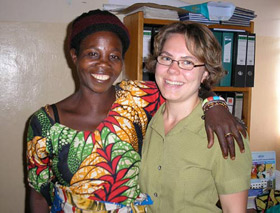
Lesen Sie weiter: Planning workshop for DDR programs in Switzerland
In May 2010 vivo was invited by the United Nations Development Program (UNDP) and the Norwegian Defence University College (NODEFIC) to share its expertise to plan a training for gender-sensitive Demobilization, Disarmament and Reintegration Programmes (DDR).

Continue reading: Planning workshop for DDR programs in Switzerland
Refugees in Kenya
Kenya is among the countries that host a very high number of refugees in relation to its population. With Kakuma and Dadab it operates two of the largest refugee camps in the world, where hundreds of thousands of refugees from Sudan, Somalia and other war-torn countries live for decades in a semi-arid region. More than half a million Somali refugees live in the country. The project in which vivo is cooperating tries to develop and evaluate adapted psychiatric treatment strategies that address PTSD, substance abuse and severe psychotic disorders.
Kenya is among the countries that host a very high number of refugees in relation to its population. With Kakuma and Dadab it operates two of the largest refugee camps in the world, where hundreds of thousands of refugees from Sudan, Somalia and other war-torn countries live for decades in a semi-arid region. More than half a million Somali refugees live in the country. The project in which vivo is cooperating tries to develop and evaluate adapted psychiatric treatment strategies that address PTSD, substance abuse and severe psychotic disorders.
vivo in Somalia
Since 1991 the country has no functioning governemt and is considered as failed state. Throughout the past 13 years, vivo has cooperated with local and international organizations to implement projects in Somaliland, the North-Western part of Somalia.
Since 1991 the country has no functioning governemt and is considered as failed state. Throughout the past 13 years, vivo has cooperated with local and international organizations to implement projects in Somaliland, the North-Western part of Somalia.
vivo’s initial steps in Uganda
Uganda has a long history of civil wars and has been surrounded by some of the worst conflicts in African history. As a consequence, Uganda hosts large refugee populations from many foreign countries and has to deal with the legacy of their own wars. vivo’s work in Uganda started in 1999 with the first trial of Narrative Exposure Therapy (NET) treating traumatized Sudanese refugees in Imvepi refugee camp situated in the very North of Uganda.
Uganda has a long history of civil wars and has been surrounded by some of the worst conflicts in African history. As a consequence, Uganda hosts large refugee populations from many foreign countries and has to deal with the legacy of their own wars. vivo’s work in Uganda started in 1999 with the first trial of Narrative Exposure Therapy (NET) treating traumatized Sudanese refugees in Imvepi refugee camp situated in the very North of Uganda.


